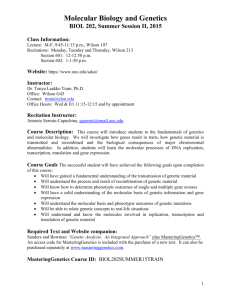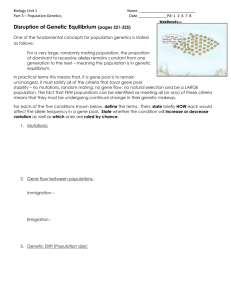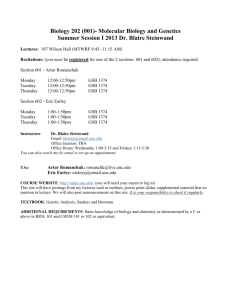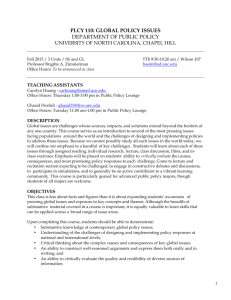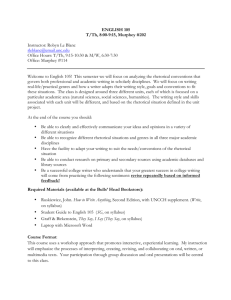Science Without Borders
advertisement
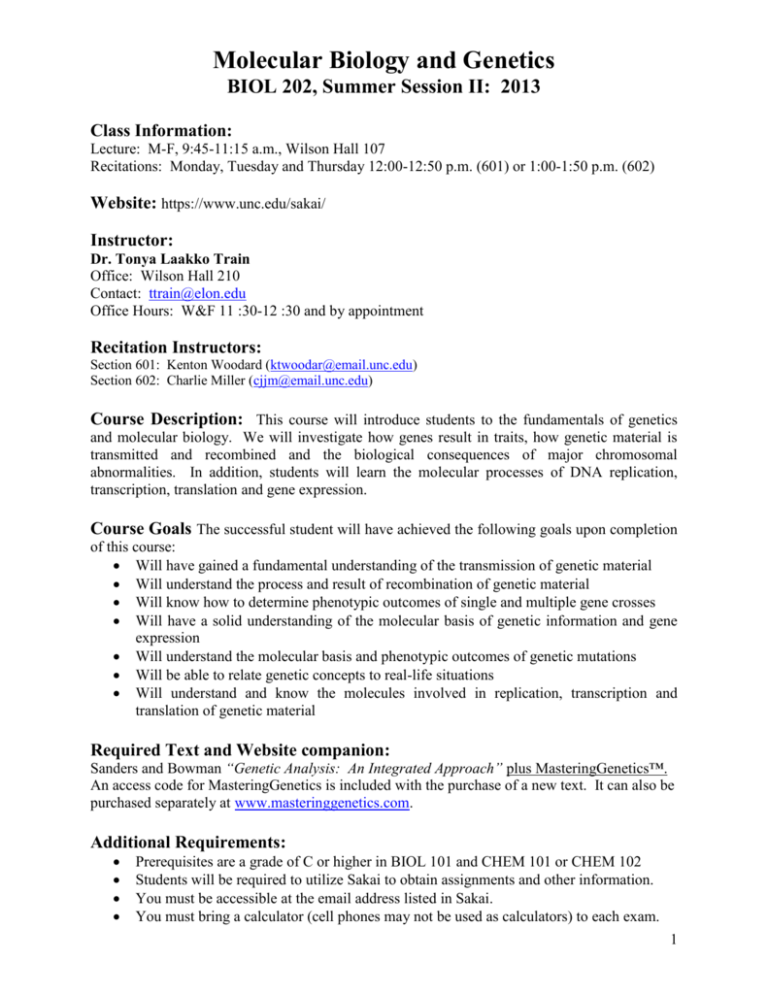
Molecular Biology and Genetics BIOL 202, Summer Session II: 2013 Class Information: Lecture: M-F, 9:45-11:15 a.m., Wilson Hall 107 Recitations: Monday, Tuesday and Thursday 12:00-12:50 p.m. (601) or 1:00-1:50 p.m. (602) Website: https://www.unc.edu/sakai/ Instructor: Dr. Tonya Laakko Train Office: Wilson Hall 210 Contact: ttrain@elon.edu Office Hours: W&F 11 :30-12 :30 and by appointment Recitation Instructors: Section 601: Kenton Woodard (ktwoodar@email.unc.edu) Section 602: Charlie Miller (cjjm@email.unc.edu) Course Description: This course will introduce students to the fundamentals of genetics and molecular biology. We will investigate how genes result in traits, how genetic material is transmitted and recombined and the biological consequences of major chromosomal abnormalities. In addition, students will learn the molecular processes of DNA replication, transcription, translation and gene expression. Course Goals The successful student will have achieved the following goals upon completion of this course: Will have gained a fundamental understanding of the transmission of genetic material Will understand the process and result of recombination of genetic material Will know how to determine phenotypic outcomes of single and multiple gene crosses Will have a solid understanding of the molecular basis of genetic information and gene expression Will understand the molecular basis and phenotypic outcomes of genetic mutations Will be able to relate genetic concepts to real-life situations Will understand and know the molecules involved in replication, transcription and translation of genetic material Required Text and Website companion: Sanders and Bowman “Genetic Analysis: An Integrated Approach” plus MasteringGenetics™. An access code for MasteringGenetics is included with the purchase of a new text. It can also be purchased separately at www.masteringgenetics.com. Additional Requirements: Prerequisites are a grade of C or higher in BIOL 101 and CHEM 101 or CHEM 102 Students will be required to utilize Sakai to obtain assignments and other information. You must be accessible at the email address listed in Sakai. You must bring a calculator (cell phones may not be used as calculators) to each exam. 1 You are responsible for checking Sakai regularly for announcements and updates. Course Policies: Attendance- It is to your benefit to attend each lecture and recitation session. This course will move quickly and cover a lot of material. If you fall behind, it will be a significant disadvantage. With that said, there is no formal penalty for absences but attendance will be documented. Absences from recitation will result in a forfeit of any points earned during that session (including homework problems). Missed Exams- You may NOT make-up missed exams. The rare exception to this policy is in the case of a University-approved absence or a documented emergency. Integrity- Lying, cheating or stealing will not be tolerated. During examinations, the only electronic device that might be allowed is a calculator. All other electronics must be stowed. During class, texting, twittering, Facebooking… is disrespectful, please refrain from e-communicating. You are bound by the University Honor Code. The following statement was provided by the office of the Vice Chancellor and Provost and applies and is the policy for this course: "The Honor Code is in effect in this class and all others at the University. I am committed to treating Honor Code violations seriously and urge all students to become familiar with its terms (http://instrument.unc.edu). If you have questions, it is your responsibility to ask me about the Code's application. All exams, written work, and other projects must be submitted with a statement that you have complied with the requirements of the Honor Code on all aspects of the submitted work.” Special Needs: Please contact an instructor as soon as possible to discuss any documented special needs. We will do everything possible to make accommodations for your success in this class. The website for the Academic Success Program for Students with Learning Disabilities can be found at http://www.unc.edu/depts/lds/. Grading: Point distribution 200 points 200 points 50 points 50 points 2 Semester exams (100 points each) Final Exam (semi-cumulative) Recitation (homework/participation) Mastering Biology The grading scale is as follows: A 93-100% A90-92.9 B+ 87-89.9 B 83-86.9 B80-82.9 C+ C CD+ D 77-79.9 73-76.9 70-72.9 67-69.9 63-66.9 Percent of grade 40 % 40 % 10 % 10 % DF 60-62.9 <60 UNC defines their grades as follows: “A - Mastery of course content at the highest level of attainment that can reasonably be expected of students at a given stage of development. The A grade states clearly that the student has shown such outstanding promise in the aspect of the discipline under study that he/she may be strongly encouraged to continue. 2 B - Strong performance demonstrating a high level of attainment for a student at a given stage of development. The B grade states that the student has shown solid promise in the aspect of the discipline under study. C - A totally acceptable performance demonstrating an adequate level of attainment for a student at a given stage of development. The C grade states that, while not yet showing any unusual promise, the student may continue to study in the discipline with reasonable hope of intellectual development. D - A marginal performance in the required exercises demonstrating a minimal passing level of attainment for a student at a given stage of development. The D grade states that the student has given no evidence of prospective growth in the discipline; an accumulation of D grades should be taken to mean that the student would be well advised not to continue in the academic field. F - For whatever reasons, an unacceptable performance. The F grade indicates that the student's performance in the required exercises has revealed almost no understanding of the course content. A grade of F should warrant an adviser's questioning whether the student may suitably register for further study in the discipline before remedial work is undertaken.” Exams: Exams will be worth 100 pts each and utilize a variety of question formats. There will be true/false, multiple choice, fill-ins, problems and short answer questions. Final Exam: The final exam will be semi-cumulative and will consist of true/false, multiple choice, short answer and problems. Format of Final Exam: 100 pts based on material not previous tested and 100 pts cumulative. Recitation: The grade for the recitation portion of this course will be comprised of attendance, graded assigned problems and in-class group work. MasteringGenetics™: MasteringGenetics™ is a web-based homework site (and also has additional learning resources). You will regularly have homework assignments due. The due date and time will be indicated for each assignment. While the length of time for completion will vary with the assignment and with the student, you should allow up to 3 hrs for each assignment. If you have internet issues, then it is YOUR responsibility to get to another computer/internet source. The videos and animations have all been tested so if you are having problems, you should try another computer. Do NOT email Dr. Train and ask to change the due date due to problems with the videos or the website or for any other reason. If you have video problems, you should go to the library and use a different computer. The due date will only be changed if there is a modification to the course schedule or if 100% of the class has a problem. 3 Lecture Outline Dr. Train reserves the right to make modifications as necessary Date Topic Reading Thurs 06/20 Syllabus; Ch 1 pp. 1-16 Ch. 2: 2.1-2.4 Wed 06/26 Course Introduction and What are Genes, Genetics and Traits? Transmission Genetics: Mono and dihybrid crosses; probabilities Transmission Genetics: Chi square analysis, autosomal inheritance and molecular basis Chromosomes and Chromosomal Transmission: Mitosis, Meiosis, Sexdetermination and Sex-linked traits Gene Interaction Thurs 06/27 Fri 06/28 Mon 07/01 Tues 07/02 Wed 07/03 Thurs 07/04 Fri 07/05 Mon 07/08 Genetic Linkage and Mapping Catch up and review Exam 1 Chromosomal Abnormalities Chromosomal Abnormalities, continued; TBA NO CLASS – Independence Day DNA structure and replication Transcription and RNA processing Tues 07/09 Wed 07/10 Thurs 07/11 Fri 07/12 Mon 07/15 Tues 07/16 Wed 07/17 Thurs 07/18 Fri 07/19 Mon 07/22 Tues 07/23 Thurs 07/25 Transcription and RNA processing, continued Translation Catch up and review Exam 2 Prokaryotic regulation of gene expression Eukaryotic regulation of gene expression Gene expression, continued Mutations and repair DNA technology Stem cells and cloning Catch up and review Final Exam 8-11 a.m. Fri 06/21 Mon 06/24 Tues 06/25 Ch. 2: 2.5, 2.6 Ch 11: 11.1, 11.2 (362-366), Ch. 3: 3.1 (pp. 64-70), 3.2 (pp. 73-80), 3.3 (pp. 81, 84-85), 3.4, 3.5 Ch 4: 4.1 (106-110; 112-113; 114116), 4.2 (119-120, 121 Pleiotropic genes), 4.3 (127-133), 4.4 Ch. : 5.1, 5.2, 5.3, 5.4 (163-164) Ch 13: 13.1-13.4 Ch 13: 13.1-13.4 Ch 7: 7.1-7.4 Ch 8: 8.1-8.3 (260-274), 8.4 (278282) Ch 9: 9.1-9.4, 9.6 Ch 14: 14.1-14.3 Ch 15 Ch 12: 12.1-12. 5 TBA TBA 4

